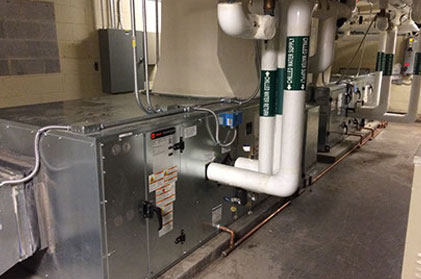What Is an Industrial HVAC System?
 Waco Inc. offers complete HVAC systems that include: fabrication, installation, renovation, and replacement services. With over 50 years of experience, our highly qualified technicians have what it takes to handle large commercial buildings and industrial facilities , from replacing a single chiller to renovating an entire HVAC system.
Waco Inc. offers complete HVAC systems that include: fabrication, installation, renovation, and replacement services. With over 50 years of experience, our highly qualified technicians have what it takes to handle large commercial buildings and industrial facilities , from replacing a single chiller to renovating an entire HVAC system.
The term “industrial HVAC” can refer to an HVAC system used in an industrial facility, or a more general term for an HVAC system used in a large building like a hospital or large business. At Waco, Inc, our specialty lies with HVAC services for industrial facilities, and we’ve put together this guide for existing and potential customers. It outlines the types of equipment used and how they differ from residential units.
HVAC Systems for Industrial vs Residential
Industrial HVAC systems provide heating, cooling, and ventilation to larger facilities, such as chemical processing, manufacturing, power generation, and water treatment plants. While they follow the same basic operating principles as residential HVAC units, they are greater in capacity and complexity. Additional concerns such as excessive heat generation from equipment or toxic fumes, require greater attention than one would expect from a residential or commercial building. That’s why it is essential to partner with an experienced industrial contractor when you want to upgrade or replace a system. They will have the knowledge and skills to ensure that the entire HVAC systems components function correctly as it pertains to the individual facility’s needs.
Types of Equipment Required f or HVAC Systems in Industrial Facilities
or HVAC Systems in Industrial Facilities
Industrial HVAC systems consist of many components, which vary depending on the specific needs of the facility. The types of equipment commonly found in them include:
Compressors
In HVAC systems, compressors reduce the volume of refrigerant gas, which increases its pressure and temperature. The high-pressure, high-temperature gas then enters the HVAC system’s condenser, which removes the heat it absorbed.
Air Separators
Air separators separate and remove entrained air from fluids. This function helps keep HVAC systems running efficiently and safely.
Chillers
Chillers use water to transfer heat away from a space. They are available in two variations: water-cooled and air-cooled.
Control Systems
Control systems allow users to monitor and manage the operation of various elements within an HVAC system. Automated control systems enable any necessary HVAC system changes (e.g., increased or decreased temperature or airflow) to be made automatically.
Cooling Towers
Cooling towers are used in combination with chillers or condensers to remove heat from the facility. Their design and size vary depending on the cooling load of the facility.
HVAC Fans
Industrial facilities use fans for a variety of purposes. For example, they are used for exhaust, air intake, ventilation, and more.
Boilers/Furnaces
Hot water or steam must be produced and maintained at much greater volumes in industrial facilities. Sizing and piping to the boiler is critical.
Humidification/Dehumidification Systems
HVAC systems can be used to control humidity within an industrial facility. If the facility requires more moisture, the system may have a humidifier unit. If the facility requires less moisture, the system may have a dehumidifier unit.
Industrial Ventilation Systems
In addition to temperature and humidity, industrial HVAC systems are used to establish proper airflow within a facility. The ventilation components help purify and circulate air as needed.
Heat Pumps
Heat pumps extract heat from the air, water, or ground. They can be used to heat or cool a facility.
Rooftop HVAC Units
Rooftop HVAC units are installed on the roof of facilities. They use ducts to circulate the air into various zones of the facility.
Split HVAC Units
HVAC systems can be categorized into single-split and multi-split units. Single-split units require each indoor unit to have a corresponding outdoor unit, while multi-split units allow multiple indoor units to connect to one outdoor unit.
How Do Residential and Industrial HVAC Systems Differ?
Industrial HVAC systems operate similarly to residential HVAC systems. The main differences between them are:
- Capacity. HVAC systems components for industrial facilities are much larger. A home or business might use a 5-ton unit while an industrial facility might use a 50 ton unit. Note: 1 ton is equivalent to 12,000 btu of cooling.
- Location. HVAC systems at industrial facilities are generally located on the rooftop of facilities or in a courtyard where both noise and heat can be reduced while in operation. Most residential HVAC systems are commonly located near the home on the ground floor.
- Complexity. HVAC systems at industrial locations are more complex and modular in design than residential HVAC systems. This means that multiple HVAC units will have all of the electrical and automatic controls in one panel box. This is critical for proper climate control and any adjusting as required.
HVAC System Solutions at Waco, Inc.
The experts at Waco, Inc. are here to help with your industrial facility’s HVAC needs. Whether you require a new installation or replacement assistance, we’ve got you covered. To learn more about our HVAC system capabilities, contact us today. To discuss your project requirements with one of our representatives, request a quote.



Comments are closed